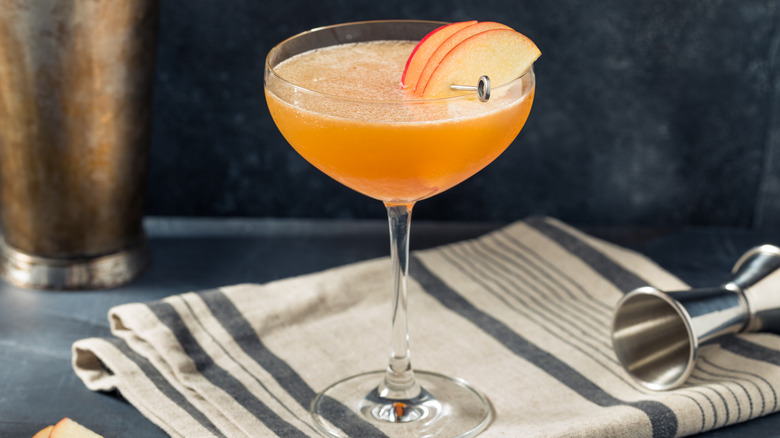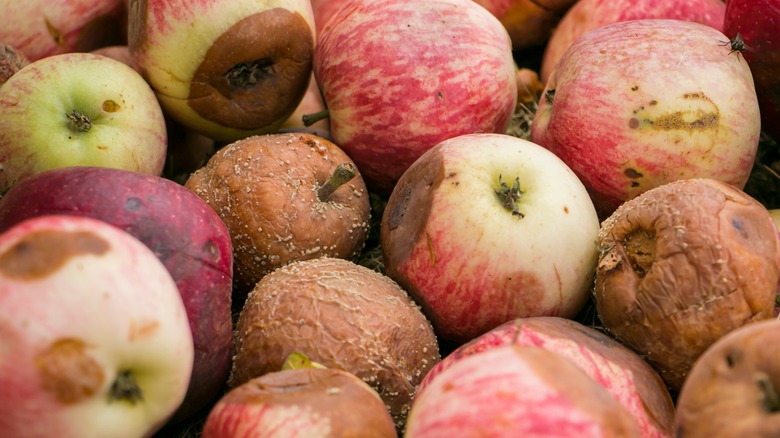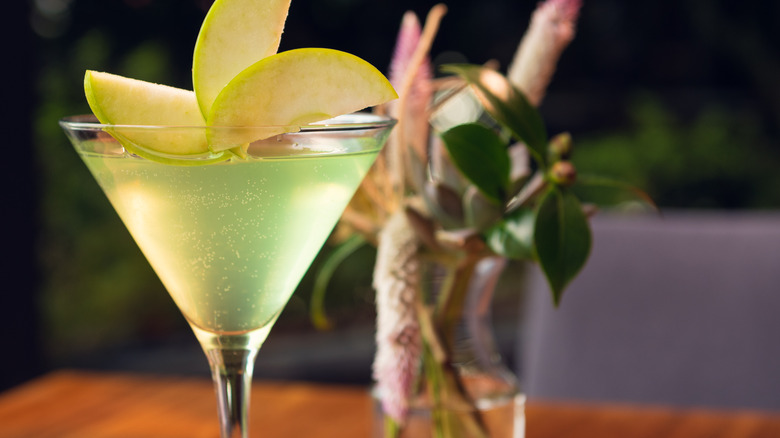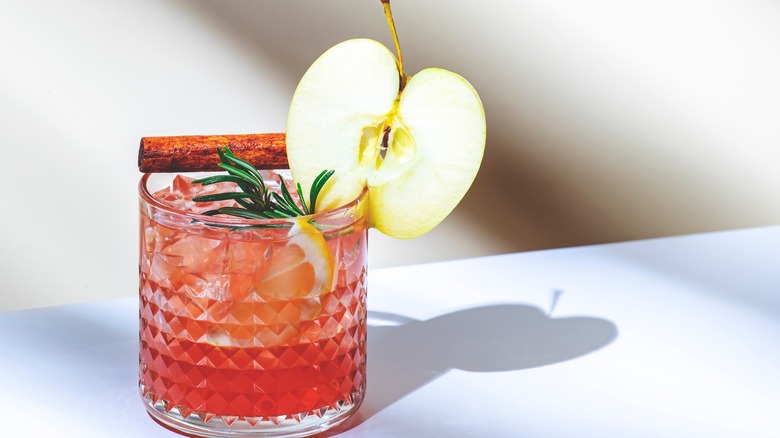Is There Any Truth To The Washington Apple Drink's Origin Story?
Cocktail origin stories are a funny thing. Almost every drink has one, but the origin of the origin story is its own adventure. Some are fairly clear: New York City bartender Sam Ross created the penicillin. Some, like the margarita, have a multiverse of creation claims, all of which may have an element of accuracy. Then there are drinks with such specific and under-documented legends that they should be taken with a grain of salt and merit deeper investigation. Such might be the case with the Washington apple.
The drink, popular in the 1990s and early 2000s as a shot or cocktail, incorporates Canadian whiskey (usually Crown Royal), sour apple schnapps, and cranberry juice. In 2021, Randy Woodward, a Seattle area writer for a bartending site called Advanced Mixology, posted a 30-page ebook called "Washington Apple Drink: 11 Recipe Variations." In it, he included a most intriguing origin story involving a carpenter, a thirst, and a bad apple harvest. Like the old ad campaign where two people collide and create the chocolate peanut butter cup, the Washington apple cocktail's origin story is entertaining. But is it real? After some poking around and failed attempts at reaching Woodard, we're not prepared to call the story out as fake, but we're going to need a whole lot more convincing before we accept it as accurate.
The origins of the Washington apple cocktail
The 1980s and '90s were a different era when it came to mixed drinks and cocktails (yes, there's a difference). Apart from simple beverages like vodka tonics, the popular cocktails of the era included sweet, fruity libations like the appletini and cosmopolitan and shooters like the lemon drop and sex on the beach. Many of these by the way, like the espresso martini (which many bartenders hate making), are making comebacks with a new, thirsty audience. Based on the number of sites posting Washington apple cocktail recipes lately, it's possible this is among those with renewed interest. "Those were the golden years of shooters," Keith Waldbauer, a bartender at Seattle's The Doctor's Office told Chowhound. Back in the day, he said, he "definitely made quite a few" Washington apples. "They were a thing for sure."
According to the introduction from Randy Woodward's ebook, the cocktail was created through a happy accident during a particularly bad apple harvest year in 1980s Eastern Washington. He says that "due to the infamous Nigerian 'Naguyuc' bug, a nasty crop failure occurred." Apparently, most farmers abandoned their crops, except for Christof Guycoogan, a carpenter. Woodward's story goes that one night at a bar, Guycoogan spilled his whiskey-and-cranberry-juice cocktail when he "tripped into a pile of rotten apples." Finding he liked the flavor combo, he took things further, fermenting "a fine apple liqueur" and introducing the cocktail, which then somehow gained popularity.
Getting to the core of the origin story
Randy Woodward's story of the Washington apple drink has been repeated in recent years almost anywhere the recipe shows up. However, it appears not much has been done to investigate its validity. This seems unusual in an era rife with cocktail origin books and articles.
"In general, cocktail origin stories should be approached with a healthy skepticism until they are proven true," said Robert Simonson, a New York Times columnist and author of cocktail books and histories, including "The Encyclopedia of Cocktails." "There's a lot of yarn-spinning and claim-grabbing out there." He told Chowhound he had never heard of the drink but felt the "'tripped into a pile of rotten apples' tale sounds particularly suspect."
Bartender Andrew Bohrer, author of "The Best Shots You've Never Tried," knows the drink. "Perhaps I don't mind saying it is shameful trash that I've made thousands of, and had a few dozen," he told us. Bohrer has worked the Seattle cocktail scene — from corner dive to craft cocktail spot — since the late 1990s. He says the ingredients play well together, and he has a "Wapple-inspired" drink in his book: the Dollar Bill (rum, applejack, pineapple juice, cranberry juice).
"I had never heard that story," Bohrer told us. "I don't know if it's more insulting to say I don't believe the origin story of the Washington apple at all, or that I would have no interest in drinking an apple brandy from Washington apples unless they're growing apples specifically for cider or distilling."
More evidence against the tale
There are a number of plot holes in the story, beginning with the drink's humorous discovery. Accidental food creation legends explain everything from the invention of Texas Toast to Crêpes Suzette, but their accuracy is often suspect. Andrew Bohrer recalled the origin story for Hendrick's Gin, where its distiller was drinking gin while sitting in a rose garden, eating a cucumber sandwich when he decided to combine the flavors. It's not that dishes can't be accidentally discovered, but it can take months of trial and error for success (just look at the Cronut).
Searching for distinctive words and names like "Guycoogan" and "Naguyuc" only turns up sites discussing the Washington apple story. Using Google Translate to turn "Naguyuc" from Swahili, Hausa, or Yoruba to English provides no results. A search through Washington area newspaper archives yielded no hits for the cocktail, the distinctive names, or any bartender named Randy Woodward. A shout-out to older Seattle-area bartenders yielded no one familiar with him.
There's no apparent evidence that Washington experienced a massive apple crop failure in the 1980s. The only "catastrophe" at the time was the decline in popularity of the ubiquitous Red Delicious apple, necessitating orchard clearing and replanting of other varieties. Finally, a "fine apple liqueur" is the product of distillation, not just fermentation (that would be cider), as any good bartender should know.
Chowhound reached out to Woodward several times via the Advanced Mixology site, using his contact information on Amazon, and through his apparent Facebook page, with no response. The investigation will continue!



